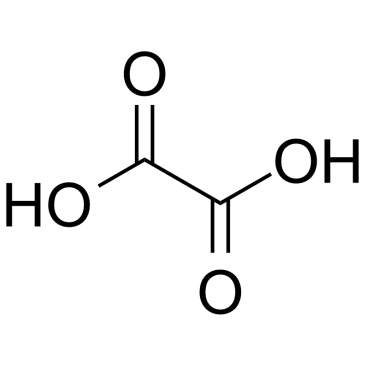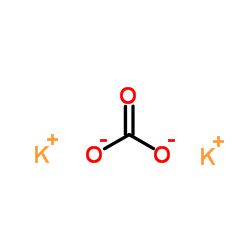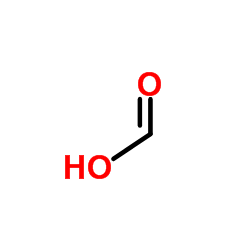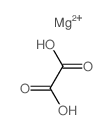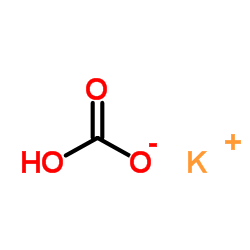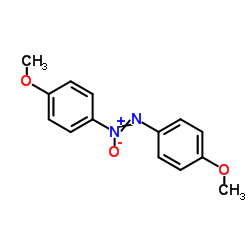127-95-7
| 中文名 | 草酸氢钾 |
|---|---|
| 英文名 | Potassium binoxalate |
| 中文别名 |
乙二酸单钾盐
乙二酸氢钾 |
| 英文别名 |
EINECS 204-873-0
Potassium hydrogen oxalate potassium,2-hydroxy-2-oxoacetate oxalic acid monopotassium salt Oxalic acid, monopotassium salt Ethanedioic acid, monopotassium salt Potassium bioxalate MFCD00036407 ethanedioate, hydrogen potassium salt (1:1:1) Ethanedioic acid, potassium salt Ethanedioic acid, potassium salt (1:1) Ethanedioic acid, potassium salt (2:1) Potassium hydrogen ethanedioate (1:1:1) |
| 沸点 | 365.1ºC at 760 mmHg |
|---|---|
| 分子式 | C2HKO4 |
| 分子量 | 128.125 |
| 闪点 | 188.8ºC |
| 精确质量 | 127.951195 |
| PSA | 77.43000 |
| 外观性状 | 白色结晶粉末 |
| 蒸汽压 | 2.51E-06mmHg at 25°C |
| 储存条件 | 室温 |
| 稳定性 | 易溶于水,不能从水中重结晶。 |
| 计算化学 | 1、 疏水参数计算参考值(XlogP): 2、 氢键供体数量:1 3、 氢键受体数量:4 4、 可旋转化学键数量:1 5、 互变异构体数量: 6、 拓扑分子极性表面积(TPSA):77.4 7、 重原子数量:7 8、 表面电荷:0 9、 复杂度:87.7 10、同位素原子数量:0 11、确定原子立构中心数量:0 12、不确定原子立构中心数量:0 13、确定化学键立构中心数量:0 14、不确定化学键立构中心数量:0 15、共价键单元数量:2 |
| 更多 | 一、物性数据 1. 性状:无色晶体 2. 密度(g/mL,25/4℃):2.0 3. 相对蒸汽密度(g/mL,空气=1):不确定 4. 熔点(ºC):不确定 5. 沸点(ºC,0.67kpa或5 mmHg):148 6. 折射率:不确定 7. 闪点(ºC):不确定 8. 比旋光度(ºC):不确定 9. 自燃点或引燃温度(ºC)不确定 10. 蒸气压(kPa,25ºC):不确定 11. 饱和蒸气压(kPa,60ºC):不确定 12. 燃烧热(KJ/mol):不确定 13. 临界温度(ºC):不确定 14. 临界压力(KPa):不确定 15. 油水(辛醇/水)分配系数的对数值:不确定 16. 爆炸上限(%,V/V):不确定 17. 爆炸下限(%,V/V):不确定 18. 溶解性:易溶于水。 |
|
Section 1. Chemical Product and Company Identification Potassium binoxalateCatalog YY289, P1187 Common Name/ Number(s). Trade Name CAS#127-95-7
Manufacturer RTECSRO3600000 SPECTRUM CHEMICAL MFG. CORP. TSCATSCA 8(b) inventory: Potassium binoxalate Commercial Name(s)Not available. CI# Not available. SynonymNot available. IN CASE OF EMERGENCY Not available. Chemical Name Chemical FamilyNot available.CALL (310) 516-8000 C2HKO4 Chemical Formula SPECTRUM CHEMICAL MFG. CORP. Section 2.Composition and Information on Ingredients Exposure Limits TWA (mg/m3)STEL (mg/m3) CEIL (mg/m3) NameCAS #% by Weight 1) Potassium binoxalate127-95-7100 Toxicological DataPotassium binoxalate on IngredientsLD50: Not available. LC50: Not available. Section 3. Hazards Identification Potential Acute Health Effects Very hazardous in case of eye contact (irritant), of ingestion. Hazardous in case of skin contact (irritant), of inhalation. Inflammation of the eye is characterized by redness, watering, and itching. Potential Chronic HealthVery hazardous in case of eye contact (irritant), of ingestion. EffectsHazardous in case of skin contact (irritant), of inhalation. CARCINOGENIC EFFECTS: Not available. MUTAGENIC EFFECTS: Not available. TERATOGENIC EFFECTS: Not available. DEVELOPMENTAL TOXICITY: Not available. The substance is toxic to kidneys, lungs, mucous membranes. Repeated or prolonged exposure to the substance can produce target organs damage. Potassium binoxalate Section 4. First Aid Measures Eye ContactCheck for and remove any contact lenses. Immediately flush eyes with running water for at least 15 minutes, keeping eyelids open. Cold water may be used. Do not use an eye ointment. Seek medical attention. Skin ContactAfter contact with skin, wash immediately with plenty of water. Gently and thoroughly wash the contaminated skin with running water and non-abrasive soap. Be particularly careful to clean folds, crevices, creases and groin. Cold water may be used. Cover the irritated skin with an emollient. If irritation persists, seek medical attention. Wash contaminated clothing before reusing. Serious Skin ContactWash with a disinfectant soap and cover the contaminated skin with an anti-bacterial cream. Seek medical attention. InhalationAllow the victim to rest in a well ventilated area. Seek immediate medical attention. Serious InhalationNot available. IngestionDo not induce vomiting. Loosen tight clothing such as a collar, tie, belt or waistband. If the victim is not breathing, perform mouth-to-mouth resuscitation. Seek immediate medical attention. Serious IngestionNot available. Section 5. Fire and Explosion Data Flammability of the Product May be combustible at high temperature. Auto-Ignition Temperature Not available. Flash PointsNot available. Flammable LimitsNot available. These products are carbon oxides (CO, CO2). Some metallic oxides. Products of Combustion Fire Hazards in Presence of Not available. Various Substances Explosion Hazards in Presence Risks of explosion of the product in presence of mechanical impact: Not available. of Various SubstancesRisks of explosion of the product in presence of static discharge: Not available. Fire Fighting MediaSMALL FIRE: Use DRY chemical powder. and InstructionsLARGE FIRE: Use water spray, fog or foam. Do not use water jet. Special Remarks onNot available. Fire Hazards Special Remarks on Explosion Not available. Hazards Section 6. Accidental Release Measures Small SpillUse appropriate tools to put the spilled solid in a convenient waste disposal container. Finish cleaning by spreading water on the contaminated surface and dispose of according to local and regional authority requirements. Large Spill Use a shovel to put the material into a convenient waste disposal container. Finish cleaning by spreading water on the contaminated surface and allow to evacuate through the sanitary system. Potassium binoxalate Section 7. Handling and Storage PrecautionsKeep away from heat. Keep away from sources of ignition. Empty containers pose a fire risk, evaporate the residue under a fume hood. Ground all equipment containing material. Do not breathe dust. In case of insufficient ventilation, wear suitable respiratory equipment If you feel unwell, seek medical attention and show the label when possible. Avoid contact with skin and eyes StorageKeep container dry. Keep in a cool place. Ground all equipment containing material. Keep container tightly closed. Keep in a cool, well-ventilated place. Combustible materials should be stored away from extreme heat and away from strong oxidizing agents. Section 8. Exposure Controls/Personal Protection Engineering ControlsUse process enclosures, local exhaust ventilation, or other engineering controls to keep airborne levels below recommended exposure limits. If user operations generate dust, fume or mist, use ventilation to keep exposure to airborne contaminants below the exposure limit. Personal ProtectionSplash goggles. Lab coat. Dust respirator. Be sure to use an approved/certified respirator or equivalent. Gloves. Personal Protection in Case of Splash goggles. Full suit. Dust respirator. Boots. Gloves. A self contained breathing apparatus should be used a Large Spillto avoid inhalation of the product. Suggested protective clothing might not be sufficient; consult a specialist BEFORE handling this product. Exposure LimitsNot available. Section 9. Physical and Chemical Properties Physical state and appearance Solid. (Hygroscopic powder.)OdorOdorless. TasteBitter. Sharp biting. 128.13 g/mole Molecular Weight ColorWhite. pH (1% soln/water)Not available. Boiling PointNot available. Melting PointDecomposes. Critical TemperatureNot available. Specific Gravity2.088 (Water = 1) Not applicable. Vapor Pressure Vapor DensityNot available. VolatilityNot available. Odor ThresholdNot available. Water/Oil Dist. Coeff.Not available. Not available. Ionicity (in Water) Dispersion PropertiesSee solubility in water. Partially soluble in cold water. Solubility Insoluble in methanol, diethyl ether. Section 10. Stability and Reactivity Data StabilityThe product is stable. Instability TemperatureNot available. Conditions of InstabilityNot available. Incompatibility with various Not available. substances Potassium binoxalate Non-corrosive in presence of glass. Corrosivity Special Remarks onNot available. Reactivity Special Remarks onNot available. Corrosivity No. Polymerization Section 11. Toxicological Information Routes of EntryEye contact. Inhalation. Ingestion. Toxicity to AnimalsLD50: Not available. LC50: Not available. Chronic Effects on Humans The substance is toxic to kidneys, lungs, mucous membranes. Other Toxic Effects onVery hazardous in case of ingestion. Humans Hazardous in case of skin contact (irritant), of inhalation. Special Remarks onNot available. Toxicity to Animals Special Remarks onNot available. Chronic Effects on Humans Special Remarks on otherNot available. Toxic Effects on Humans Section 12. Ecological Information Not available. Ecotoxicity BOD5 and CODNot available. Products of BiodegradationPossibly hazardous short term degradation products are not likely. However, long term degradation products may arise. Toxicity of the ProductsThe products of degradation are more toxic. of Biodegradation Special Remarks on theNot available. Products of Biodegradation Section 13. Disposal Considerations Waste Disposal Section 14. Transport Information DOT ClassificationNot a DOT controlled material (United States). IdentificationNot applicable. Special Provisions forNot applicable. Transport Potassium binoxalate DOT (Pictograms) Section 15. Other Regulatory Information and Pictograms TSCA 8(b) inventory: Potassium binoxalate Federal and State Regulations California Proposition 65 Warnings Other RegulationsOSHA: Hazardous by definition of Hazard Communication Standard (29 CFR 1910.1200). WHMIS (Canada) CLASS D-2A: Material causing other toxic effects (VERY TOXIC). Other Classifications DSCL (EEC)R38- Irritating to skin. R41- Risk of serious damage to eyes. Health Hazard HMIS (U.S.A.)2 National Fire Protection 1 Flammability 1 Association (U.S.A.) Fire Hazard 2 0 Reactivity Health Reactivity 0 Specific hazard Personal Protection E WHMIS (Canada) (Pictograms) DSCL (Europe) (Pictograms) TDG (Canada) (Pictograms) ADR (Europe) (Pictograms) Protective Equipment Gloves. Lab coat. Dust respirator. Be sure to use an approved/certified respirator or equivalent. Wear appropriate respirator when ventilation is inadequate. Potassium binoxalate SECTION 16 - ADDITIONAL INFORMATION N/A |
|
毒理学数据: 1、急性毒性:女人经口TDLO:100mg/kg 女人经口LDLO:660mg/kg 女人经口TDLO:400mg/kg 男人经静脉注射TDLO:1071mg/kg CHEMICAL IDENTIFICATION
HEALTH HAZARD DATAACUTE TOXICITY DATA
|
| 危险品运输编码 | 2811 |
|---|---|
| 包装等级 | III |
| 危险类别 | 6.1(b) |
|
~% 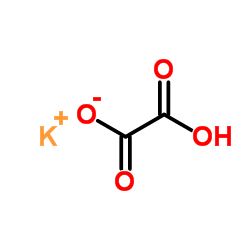
127-95-7 |
| 文献:Justus Liebigs Annalen der Chemie, vol. 146, p. 140 |
|
~% 
127-95-7 |
| 文献:Ann. Chim. Phys., , vol. 4, p. 457 |
| 上游产品 2 | |
|---|---|
| 下游产品 8 | |



